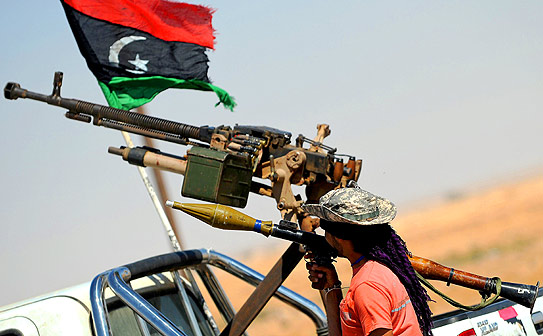
BENGHAZI: While Libyan rebels struggle to push the front line west, lawyers in the east are attacking satellite networks that air Muammar Qadhafi's TV channels because they incite “hate and violence.”
“Qadhafi exploited the channels to transmit military codes,” said lawyer Issam al-Mawy, adding that when the Libyan strongman mentioned a city in one of his speeches, it was attacked shortly after by loyalist troops. “We have tons of footage and evidence,” he said.
A Libyan firm of six lawyers accuses regime broadcasters - including Al-Jamahiriya and Al-Jamahiriya 2 - of inciting hate and violence by painting rebels as terrorists seeking to split the country in two.
In the first speech by the Libyan strongman after demonstrations erupted against him mid-February, Qadhafi struck a strident tone, telling supporters to “go out and capture the rats.” If nothing else, Qadhafi is guilty of “defamation and libel,” lawyer Mawy said, because he had tarnished the reputation of rebels by saying they were in cahoots with Al Qaeda and slandered individual members of the opposition.
Although Qadhafi has only made a handful of rabble-rousing speeches since protests escalated into a violent conflict that has claimed hundreds of lives, Libyan broadcasters are widely viewed as an extension of the regime.
Abdel Hafiz Ghoga, vice-chairman of the Benghazi-based National Transitional Council (NTC), said Qadhafi's regime had “without a doubt used media as a weapon, as a bullet” to spread prograpanda.
The United States would appear to share that view. On Thursday it put Libyan Jamahiriya Broadcasting, which transmits news on several channels inside Libya and via satellite across the Middle East, under sanctions.
Lawyer Mawy said regime channels had aired footage showing the corpses of rebel fighters to support claims that NATO's airstrikes had caused civilian casualties instead of hitting military targets.
“He is using the corpses of rebels he killed to say they are casualties of NATO,” Mawy said.
A Libyan diplomat and writer said the main reason people rush towards camera crews in Tripoli shouting support for Qadhafi is to “show their faces” and “reassure friends and family” in the rebel east that they are fine.
“Some of the people at Bab al-Aziziyah are war prisoners,” said Idris Tayeb Lamin, in reference to the complex that houses military barracks and Qadhafi's residence.
“They rush to the cameras because they want to show their families here they are alive,” said Lamin, who served 10 years of a life-sentence before being pardoned.
Mawy said his top priority is to force Egyptian satellite network Nilesat to remove the regime's channels, which he says broadcasts programmes showing “armed presenters directly threatening Libyans.”
A judge in the eastern city of Al-Bayda ruled in favour of the lawyers in late March, but for the order to carry any weight in Egypt, it must be signed by Cairo's envoy to Libya.
The obstacle? Libya's neighbour to the east does not recognize the NTC, which has set up its headquarters in the coastal city of Benghazi and claims to be the legitimate representative of the Libyan people.
Only France, Italy, Qatar and Gambia have recognised the interim body.
“We are hoping for a diplomatic solution,” sald Mawi. Should this avenue remain blocked, he said the lawyers were prepared to partner with Egyptian counterparts to raise a claim against Nilesat directly from Egypt. “Nilesat has to take responsibility morally and legally,” said Mawy.
The NTC's media representative said the interim body had made a direct request to Nilesat to take the channels down but that this bid was unsuccessful as Qadhafi simply “paid double” to keep them.
Nilesat chief engineer Salah Hamza has said the network's “code of conduct is to respect the contract,” but he refused to answer questions on the controversy by phone and did not reply to questions repeatedly sent by email.
Missing from the picture, said Mohammed Abdel Dayem, programme coordinator for the Middle East and North Africa at the New York-based Committee to Protect Journalists, is a “thorough and transparent content analysis” of the channels.
If the broadcasters' acts met the legal definition of “incitement to violence” as set by the Geneva Convention, he said, they would be candidates for jamming, blocking or removal from the air by technical means.
“While Libyan state broadcasts have certainly been engaged in propaganda and at times provocative and instigatory acts, they do not currently constitute legitimate targets for disruption,” he said.
Media outfits could also be considered targets under the Geneva Convention if they make an effective contribution to “military action,” Dayem said.
But NATO, which is currently bombing Kadhafi's military installations, communication centres and troops as part of a UN-mandated air campaign to protect civilians, says it has not struck broadcasting facilities.












































